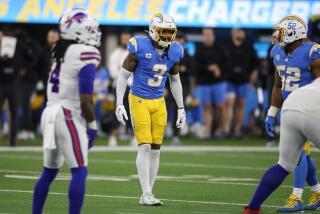San Diego nightmare: Tell me again why any city would do business with the NFL
One thing you have to say about San Diego’s civic leaders in their dealings with the National Football League Chargers is that they’ve done their best.
Only a month ago they put forth a financing plan for a 65,000-seat, $1.1-billion stadium to keep the team from relocating to Los Angeles County that involved at least a half-billion dollars in contributions from city and county taxpayers, squeezed out without the nicety of taxpayer votes.
At the time we observed that it set “a new standard for allowing the league to exploit municipal panic and using financial sleight-of-hand to make the process look painless.” We also speculated that the Spanos family, the Chargers’ owners, would “reject this deal, if they think the public isn’t putting up enough.”
That’s what’s happening. As my colleague Sam Farmer reported this week, San Diego is grousing that “even though the city and county have gone out of their way to try and accommodate the team...the Chargers have thrown up one road block after another.” Those are the words of Tony Manolatos, spokesman for San Diego Mayor Kevin Faulconer’s stadium task force.
San Diego has a right to be appalled. It doesn’t have a right to be surprised. This is how the NFL and its teams operate when they’re trying to get themselves a new stadium. To their incumbent cities, they dangle their interest in staying on a string; to wanna-be cities, they dangle their interest in relocating. The city of Carson, which is hoping to become the Chargers’ new home, should sign up for San Diego’s correspondence course in surviving the NFL.
Oh, sure, the Chargers say their discontent with the San Diego offer stems from Faulconer’s plans to hold a city-only taxpayer vote despite the original financing proposal. (There are no plans for a vote by county taxpayers, who would be on the hook for at least $121 million.) Chargers spokesman Mark Fabiani says the city vote, scheduled for December, wouldn’t meet election and environmental law requirements and would lead to “significant time-consuming litigation founded on multiple legal challenges, followed by a high risk of eventual defeat in the courts.”
The fed-up civic leaders see this as mere pretext. They would be totally within their rights to conjecture that if the Chargers really wanted to stay in San Diego--and if the taxpayers put up more money--they’d find a way to do so.
The reality is that the Chargers have a free path to leaving San Diego. That’s the consequence of a sweetheart deal the community granted the team that has allowed them to break their lease without consequences every year since 2007. They’ve stayed, at considerable cost to San Diego, which has had to pay for the upkeep of Qualcomm Stadium. Unless you believe that the Chargers, who have appeared in one Super Bowl in their history (and lost), bring some glitter to San Diego that translates into economic gain, the Chargers have been a deadweight loss to the community. Indeed, given its existing drivers of economic growth, including tourism, high-tech industry and the military, San Diego is the very model of a place that doesn’t need the NFL.
That hasn’t kept the team from swanking around as though San Diego might cease to exist without it. The Chargers’ treatment of the community is nothing short of contemptuous. Responding to accusations that the team is “sabotaging” the talks, Fabiani said, “Why would we need to sabotage anything?... Long ago, we satisfied the NFL’s relocation guidelines. We don’t have to go to meetings and pay lawyers to study proposals.” Then he suggested that the city hadn’t moved fast enough to come up with its taxpayer handout.
These are the people whom the city of Carson thinks it can do business with. Good luck. But don’t say you weren’t warned.
Keep up to date with the Economy Hub. Follow @hiltzikm on Twitter, see our Facebook page, or email michael.hiltzik@latimes.com.
MORE FROM HILTZIK:
California labor regulators blast a big hole in Uber’s ‘sharing economy’ dodge
From Wisconsin to California, the decline of public higher ed continues
A great author foresaw our discontent with the ‘Internet of Things’ -- in 1909







